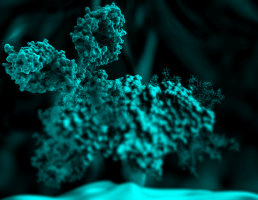
MEDI4736 and tremelimumab combination shows clinical activity and tolerability in both PD-L1 positive and PD-L1 negative advanced non-small cell lung cancer (NSCLC) patients; dose confirmed for future studies
Results from a combination study of MEDI4736 and tremelimumab, a cytotoxic T-lymphocyte-associated protein-4 (CTLA-4) monoclonal antibody, in the treatment of advanced non-small cell lung cancer (NSCLC) demonstrated clinical activity in heavily-pretreated patients with a manageable safety profile, establishing appropriate doses to move forward into Phase III combination trials.
MEDI4736 and tremelimumab target two different tumour escape pathways; engaging the immune system to fight the cancer’s immune-evading tactics and maintaining tumour specific T-cell responses.
Data from the Phase Ib open label, dose escalation study of patients with advanced NSCLC, showed that the combination of the PD-L1 and CTLA-4 blockade helped to increase response rates in both PD-L1 biomarker positive and negative patients.
63 patients with 16 weeks or more of follow up were evaluable for clinical activity, 102 patients were evaluated for safety.
Notably, the data demonstrated specific clinical activity and tolerability in PDL-1 negative patients, who make up approximately 70% of NSCLC patients and who are less likely to respond to monotherapy.
In the PD-L1 negative patient subset, overall response rate (ORR) was 27% (9/33) and disease control rate (DCR) – defined as complete response (CR), partial response (PR) or stable disease (SD) for 16 weeks or more – was 48% (16/33).
Overall, nearly half of patients in the study achieved a partial response or stable disease, with ORR of 27% (17/63) and DCR of 41% (26/63). (Antonia et al, abstract #3014).
Overall adverse events (AEs) were manageable and generally reversible using standard treatment guidelines.
The most frequently reported treatment related grade 3/4 AEs across all dose cohorts were colitis, diarrhoea, elevated lipase and elevated liver function tests.
20/102 patients discontinued the study due to drug-related AEs in this heavily-pretreated disease setting.
The combination data presented at ASCO builds on preliminary results from 18 patients presented at the European Society of Medical Oncology Congress in September 2014.
A range of doses were identified that provided clinical benefit with acceptable tolerability, with a specific dose and schedule of MEDI4736 20mg every four weeks (12 total doses) and tremelimumab 1mg/kg every four weeks (four total doses) selected for future Phase III combination trials in NSCLC.
This decision was supported by data from the trial, which evaluated key indicators of best outcomes for patients (clinical efficacy, tolerability and biologic activity) to ensure that each molecule contributes optimally in the combination.
Data indicated that the selected dose of tremelimumab is well tolerated and enhances clinical activity as efficaciously as the other doses studied.
The study design for the ongoing Phase III ARCTIC trial, designed to evaluate the efficacy and safety of the combination of MEDI4736 and tremelimumab in NSCLC patients with PD-L1-negative tumours, as well as MEDI4736 versus standard of care in NSCLC patients with PD-L1-positive tumours, was also presented at ASCO. (Planchard et al, abstract #TPS8104)
A Phase II study of MEDI4736 and tremelimumab as monotherapies and in combination in patients with recurrent squamous cell carcinoma of the head and neck (SCCHN) was also recently started.
Source: AstraZeneca
The World Cancer Declaration recognises that to make major reductions in premature deaths, innovative education and training opportunities for healthcare workers in all disciplines of cancer control need to improve significantly.
ecancer plays a critical part in improving access to education for medical professionals.
Every day we help doctors, nurses, patients and their advocates to further their knowledge and improve the quality of care. Please make a donation to support our ongoing work.
Thank you for your support.